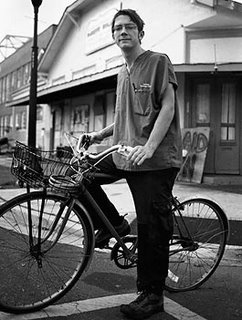The Street Samaritans

MotherJones
Post-Katrina volunteer medics on bicycles created a new model of community health care in New Orleans.
Tim Shorrock
Post-Katrina volunteer medics on bicycles created a new model of community health care in New Orleans.
Tim Shorrock
March/April 2006 Issue
NEW ORLEANS - In the days after Hurricane Katrina slammed into New Orleans, the city’s Algiers neighborhood was one of the few that stayed dry. Although Katrina’s winds caused extensive damage to roofs and toppled trees and power lines, there was no water in the streets or in houses like there was in the rest of the city. Still, Algiers was left without electric power or running water for many days, and the invasion of the city by thousands of soldiers, federal police officers and private paramilitary personnel created an atmosphere of tension and trepidation. In Algiers, as in other neighborhoods, the National Guard imposed a mandatory dawn-to-dusk curfew. In one area, white residents frightened by rumors of car-jackings and looting camped out on their roofs and organized patrols, guns at the ready. Late one night, National Guardsmen and a SWAT team from the New Orleans Police Department raided the Algiers Fischer Housing Development in search of someone who had fired at a cell phone truck; black youths then took guns from local pawn shops and vowed to fight the troops and what they called white vigilantes. Algiers resident Ronald Ragens, 55, remembers those days as lonely and frightening. “All you was seein’ was police, military and all kinds of huge trucks running supplies here and there, and helicopters flyin’ over like it was a war zone,” he recalls. “It was rough.”

Then one morning four days into the storm, something happened that melted the fear and eased the tension. Four young people on bicycles showed up in Algiers, knocking on doors and asking if anyone needed medical attention. Asked if they were from the Red Cross or the Federal Emergency Management Agency, neither of which had yet made an appearance in Algiers, the medics said no, they were just volunteers who had come without authorization. They offered first aid, took blood pressure, tested for diabetes, and inquired about symptoms of anxiety, depression and disease. “It was just about the noblest thing I’ve ever witnessed in my life,” recalls Malik Rahim, a lifelong Algiers resident, local housing activist and former Black Panther Party member who helped arrange space for the medical workers in a local mosque. ”It was the street medics who really stopped this city from exploding into a race war, because they were white and were serving the black community at a time when blacks were fed up. Those are the real heroes of this thing.”
http://www.motherjones.com/news/feature/2006/03/common_ground_long.html

0 Comments:
Post a Comment
<< Home